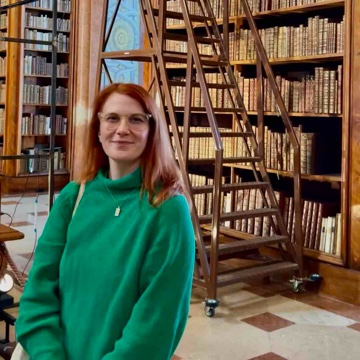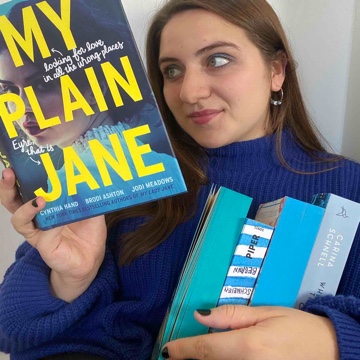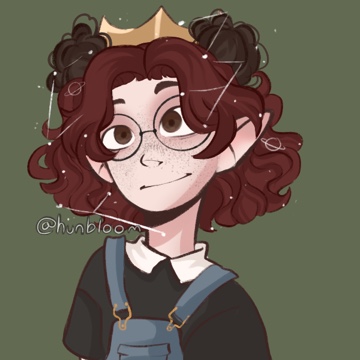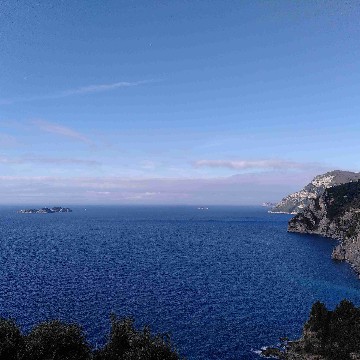I have very mixed feelings about this book. In the first 150 pages, I had a hard time to keep reading, because Ariadne was such a dull character and the writing style a bit too old-style. However, once the retelling bit really set in on the exile island, the plot got more exciting. It was also interesting to read Ariadne's sister POV. From then one, I devoured the pages, but at the end, I found myself in the same reading slump because again, Ariadne's personality just couldn't excite me. Soo not sure if I would recommend it. For the Greek Mythology parts, definitely. But in my opinion, it cannot keep up with Madeileine Miller's retellings.
I just finished this - and I have feelings! I was so excited about this book when I first heard about it. I preordered it, anxiously waited for its arrival and marveled at the beautiful cover (repeatedly, if I am honest). As a big fan of... well, whatever Madeleine Miller puts on paper, I so wanted to love this book. And I think I could have really liked it, had it not been for the misleading marketing. I am convinced that the publisher just did the book and the author a disservice here, for two reasons: 1) Madeleine Millers works are loved by so many people (and rightfully so!) that it is just not fair to directly compare a debut author to her. In doing so, the publisher made me expect to love the book just as much as I loved Circe, which, if we are honest, is a mark that is near impossible to hit. 2) "Feminist retelling"? I don't think so. I think we should all agree that just telling something from a woman's perspective doesn't make a narrative be feminist. In Ariadne, the men remain the strong characters, the decision makers, the persuaders, while the women are... dare I say it? Insufferably agreeable. These two problems are, however, marketing issues. So let me try my best to strip myself of all expectations I had prior to reading this book and look at it as objectively as I can possibly manage. The writing style? Beautiful. Stunning language, expertly described emotions. The plot? Didn't know where it was going and was featuring a whole nest of prime examples for one-dimensional characters. The ending? About as well thought-out as the end of this review.
5 ⭐️ from me! Beautifully written, moving and evocative.
Das Buch hat mich so zerstört, dass ich davon überzeugt bin, dass es ein persönliches Problem mit mir hat.
Danke an NetGalley und den List Verlag, die mir ein Rezensionsexemplar zur Verfügung gestellt haben. Meine Meinung ist davon unabhängig. Ariadne. Auf dich habe ich mich so unglaublich gefreut. Eine Nacherzählung eines griechischen Mythos, der Frauen in den Vordergrund stellt… das passt eigentlich perfekt zu mir. Ich liebe Mythologie und ich liebe Feminismus. Ich bin ein großer Fan von Madeline Millers „Das Lied des Achill“ und „Ich bin Circe“, und ich hatte gehofft, dass mich auch „Ich, Ariadne“ ähnlich begeistern wird. Es hat mir gut gefallen, aber es war doch kein Highlight wie erhofft. Worum geht es? Das erste Drittel des Buches ist der altbekannte Mythos: Ariadne als Prinzessin von Kreta hilft dem Prinzen Theseus aus dem Labyrinth des Minotaurus zu entkommen (der Minotaurus ist Ariadnes Halbbruder, der aus einer Verbindung ihrer Mutter mit einem Stier entstand; und Theseus ist im Labyrinth weil der König von Kreta den Krieg gegen Athen gewonnen hat und alle neun Jahre 14 Kinder von Athen als Tribut und „Futter“ für den Minotaurus anfordert). Theseus flüchtet mit Ariadne; aber dann lässt er sie auf der Insel Naxos alleine zurück. Nun gibt es mehrere Versionen in der Mythologie, wie es weitergeht. In diesem Buch hier erscheint Dionysos, der Gott des Weines, als ihr Retter, und wir erfahren über die Beziehung der beiden. Eine unerwartet große Rolle spielt auch Ariadnes kleine Schwester Phädra, die ebenfalls von Theseus aus Kreta gerettet wird, und in dem Denken aufwächst, dass Ariadne tot sei. Der Titel „Ich, Ariadne“ hat mich etwas fehlgeleitet, da es wirklich in fast gleichen Maßen um die beiden Prinzessinnen geht. Doch besonders im Vergleich mit Madeleine Millers Werken erscheint dieses Buch eher blass. Der Stil ist nicht so poetisch, und es konnte meine Aufmerksamkeit auch nicht so bannen. Wahrscheinlich hätte mir das Buch viel besser gefallen, wenn ich noch kein Madeline Miller Buch gekannt hätte. Also falls ihr ein riesen Madeline Miller Fan seid und hofft, dass dieses Buch genauso gut sein wird, werdet ihr ziemlich sicher enttäuscht werden. Es ist eine gute Geschichte; eine spannende Interpretation eines Mythos, aber kommt nicht an Achill oder Circe ran. Ich gebe 3,5 von 5 Sternen.
Der Vergleich liegt zwar nahe, aber Jennifer Saint kommt leider nicht annähernd an Madeline Miller heran! Also weiter sehnsüchtig warten, bis die Queen der griechischen Mythologie Retellings ihr nächstes Buch veröffentlicht
Ein unglaublich tolles Buch! Für alle, die die Bücher von Madeline Miller gelesen habe ist dieses Buch ein absolutes Must-Read. Die Autorin hat einen wundervollen Schreibstil der den Leser einfach mitreißt und in den Bann zieht.
This is a book where a part of me believes it´s a case of "It´s not you, it´s me". There are bits and pieces, mainly the references that made me go "Oh, I know this story!", that kept me reading but other than that, a lot of what this book did simply not work for me. The writing is very confusing. It is very clearly intended to be a "Ariadne and Phaedra are actually telling the story to us" but the tone changes as time goes by, which doesn't make sense if it's future Ariadne and Phaedra talking to us. Ariadne's story telling went from juvenile - which would make sense if it was a present tense 18yo Ariadne talking - to more maturity at Naxos. Phaedra though continues to sound very, very young. It has repeatedly taken me out of the story. It did work in the sense that a lot of this book sounds like a running trail of thought. The timeline also makes barely any sense, since there is no true indication of how much time has passed. The majority of Phaedra's youth is just skipped, probably to get to the quasi-incest part of her mythology. But in one second they talk about two years after her wedding, then another second she's having a child and another one immediately on the way. Ariadne also has two children and suddenly when Phaedra arrives, she talks about her five (?) children. It makes the reading less fun to be constantly confused by what happens. Large chunks of time are just skipped over without any information. If you can't neatly tell the story you want to tell within 300 pages, either cut out the other POV or simply go longer. Or please just do a "five years later". What annoys me the most though is that both Phaedra and Ariadne are incredibly passive past the first few chapters of the book. As soon as Ariadne is on the ship with Theseus, she barely does anything of her own accord for the rest of the book. Same with Phaedra. As soon as she is in Athens, she becomes less and less proactive with each chapter. For all its supposed attempt at a feminist message, both sisters let a lot of what happens just happen to them. While it is nice that Phaedra is shown to have no maternal instincts, the actual implications of it in the time she was in is pushed aside for the quasi-incest. Meanwhile, Ariadne becomes barely more than a stay-at-home mom who has no idea what her husband is doing at night. She becomes a shell of herself. A propos the feminism: This is the main thing that gets me to believe "maybe it's me, not you". I know of the endings of Ariadne's and Phaedra's stories. But this book started out with Ariadne and Phaedra being angry at the women who are punished for the wrongdoings of men. They want to change things. I hoped, at least, that this book wasn't just a compiled book of their stories, that maybe Jennifer Saint would either give them a different ending or have them go out more honorably. Instead, Saint seemingly ignored that there is a version of Phaedra's story that had her cursed and just made her a desperate woman who falls for her stepson. We get Phaedra just killing herself the second she's rejected and Ariadne getting killed because of her husband's arrogance. What kind of message is that? We are at the whims of our husbands and we have the choice to rationalize their bullshit or kill ourselves? Great. See, maybe I am just not the type of person to be comforted by this kind of message in this day and age but this is just so pessimistic. If I wanted that, I would just read the original myths.
Ich liebe griechische Mythologien und die Nacherzählungen, besonders jene in denen der Fokus auf einer oder mehreren Frauen liegt. Jennifer Saint schafft es wirklich gut zu zeigen, warum die Frauen jener Geschichten nicht vergessen werden dürfen. Gerade die Beziehung von Ariadne und ihrer Schwester hat mir sehr gut gefallen und ist so wichtig
Loved the writing and the first half in particular. However, I felt like the author didn't add anything new to the story and was to rigid while re-telling the myth. She could have easily changed the ending or at least have the sisters interact more, so that the last few pages didn't leave as sour of a note in my mouth as it did. I've read other re-tellings of greek myths that, while still ending in tragedy, incorporated intereting new perspectives of characters that didn't have a voice in the original myth and left the reader with some sense of hope. The message in this was basically: you can try to escape your fate and do some good, but in the end it's all for nothing cause you're a woman. So, yeah, hence the three stars.
Ungeschlacht. Mit der Einführung der Perspektive Phaedras wurde es interessanter, aber es bleibt eine sprachlich prätentiose Nacherzählung mit Focus auf weiblicher Leidensfähigkeit. Alles, bloß nicht feministisch
6 von 5 Sternen! Absolutes Lesehighlight. Tief bewegend und inspirierend. Wundervolle Geschichte mit starken Frauen im Vordergrund. Ein kleines bisschen hat es mich aber schon gestört, dass jede männliche Figur so negativ gezeichnet wurde. Es hätte ja durchaus auch einen mitfühlenden Mann geben können, der nicht nach Macht giert. Ich liebe die feministische Stärke dieses Buches, aber es ist mir ein wenig zu männerfeindlich. Aber abgesehen davon eine durchwegs gelungene und verzaubernde Geschichte! Das Ende hat mich eiskalt erwischt!
This book should be called: Why men are the fundamentel cause of womens problems: A tragedy.
Es war nicht ganz so, wie ich es erwartet hatte und ab und an hat es sich sehr gezogen. Trotzdem hat es mir insgesamt ganz gut gefallen. 3,25 ⭐
I finished the book with a strong feeling of "omg I really hate men" for all the actions I saw from Theseus and Dionysus. Btw, I still loved how Ariadne was so brave all the time. I still remember reading this and thinking wow I want to have her conviction: "I would be Medusa, if it came to it, I resolved. If the gods held me accountable one day for the sins of someone else, if they came for me to punish a man’s actions, I would not hide away like Pasiphae. I would wear that coronet of snakes, and the world would shrink from me instead." I love that at no point the author presented Ariadne or Phaedra as weak characters.
3,5 ⭐️⭐️⭐️✨ Ein Buch, das so ziemlich alle Männer der Welt verflucht- i like it Es war spannend über Ariadne mehr zu erfahren, über Dionysos, Gott des Weines, der ja in den meisten Geschichten eher als „schwächerer“ Gott dargestellt wird, der nur Unfug und Wein im Kopf hat Die Geschichte ist eine tragische Geschichte über das Leid von Frauen, die im Schatten ihres Mannes stehen. Männer, die Ruhm und Ehre und Verehrung wollen. Und es ist die Geschichte von einer Frau, die immer nur wollte, dass ihre Liebe genug ist. Ariadnes und Phädras Geschichte hätte so so bewegend sein können aber bis zu einem gewissen Punkt hat sie mich einfach kalt gelassen. Ich habe Theseus 410 Seiten lang gehasst und war absolut schockiert von den Taten eines gewissen Gottes am Schluss. Aber das spezielle Schicksal und die Gefühle von den Schwestern blieben immer irgendwas abstraktes Trotzdem war das Buch gut und griechische Mythologie in feministisch >>>>>>> (Vielleicht bin ich einfach auch voreingenommen von Circe?)
I really tried to love it, but the writing style made it impossible for me to keep a steady reading flow. It took me ages to read every single chapter and I lost focus may times. But that's okay, not every book works for everyone
Tolle Geschichte, auch für Neulinge in der griechischen Mythologie. Erzählt aus der Sicht der Frauen und Fokus auf deren Rolle in der Mythologie.✨️
"I had hit upon a truth for womanhood: however blameless a life we led, the passions and the greed of men could bring us to ruin, and there was nothing we could do." Das beste Buch, das ich - vielleicht seit Jahren - gelesen habe. Griechische Mythologie, aber aus der Perspektive einer Frau - und wie das Zitat schon andeutet, kommen diese in den Mythen leider oft sehr schlecht davon, sie werden ungerecht behandelt und müssen für die Fehler anderer - Männer - büßen. Ich kenne die Mythen von Dionysos, Theseus, dem Minotaurus, Ariadne und so vielen weiteren Charakteren schon seit einer Ewigkeit, aber in diesem Buch wurde ich mit einer beinahe völlig neuen Perspektive konfrontiert. Jetzt will ich noch mehr Bücher über griechische Mythen lesen, aber aus anderen Gründen, und auf andere Art und Weise. Oh, und ich brauchte Taschentücher beim Lesen. Sehr viele. Lest dieses Buch!
Zeigt auf eindrückliche, an Madeline Millers "Circe" erinnernde Weise, wie die Frauen im antiken Griechenland unter der Willkür, dem Blutdurst und der Geltungssucht der männlichen Götter und Helden gelitten haben. Die Schwestern Ariadne und Phaedra erfahren mehrfach am eigenen Leib, was Ohnmacht in diesem Zusammenhang bedeutet und wie wenig eigener Spielraum bleibt, wenn die Männer über sie verfügen und entscheiden. Nicht ganz so empowernd wie Circe, aber trotzdem überzeugte 4 von 5 Sternen und eine Leseempfehlung für alle, die mehr mit Circe als mit Achill mitschwingen konnten. "Der Preis, den wir für den Rachedurst, die Lust und die Gier arroganter Männer bezahlten, war die Quelle unseres Schmerzes."























